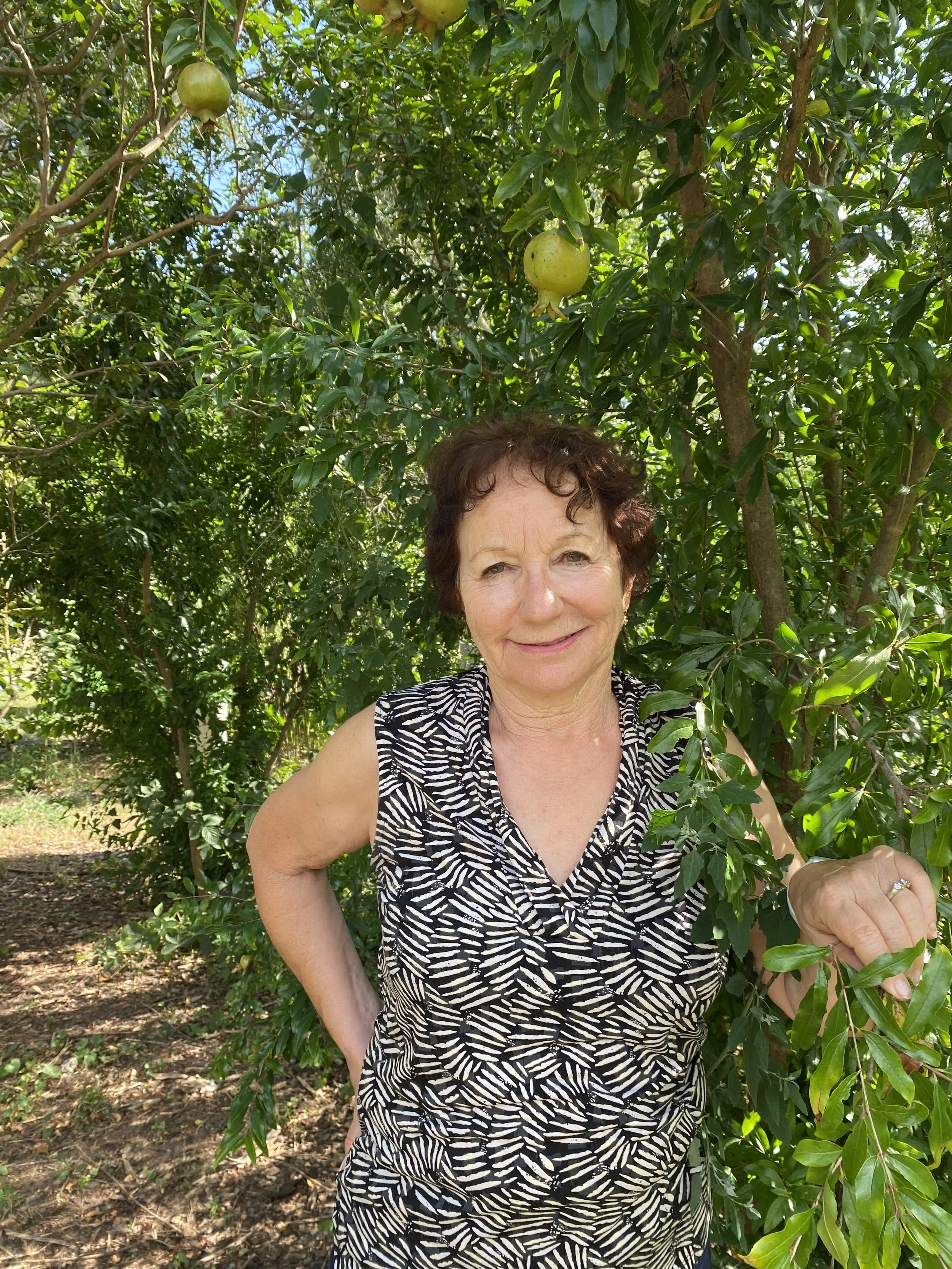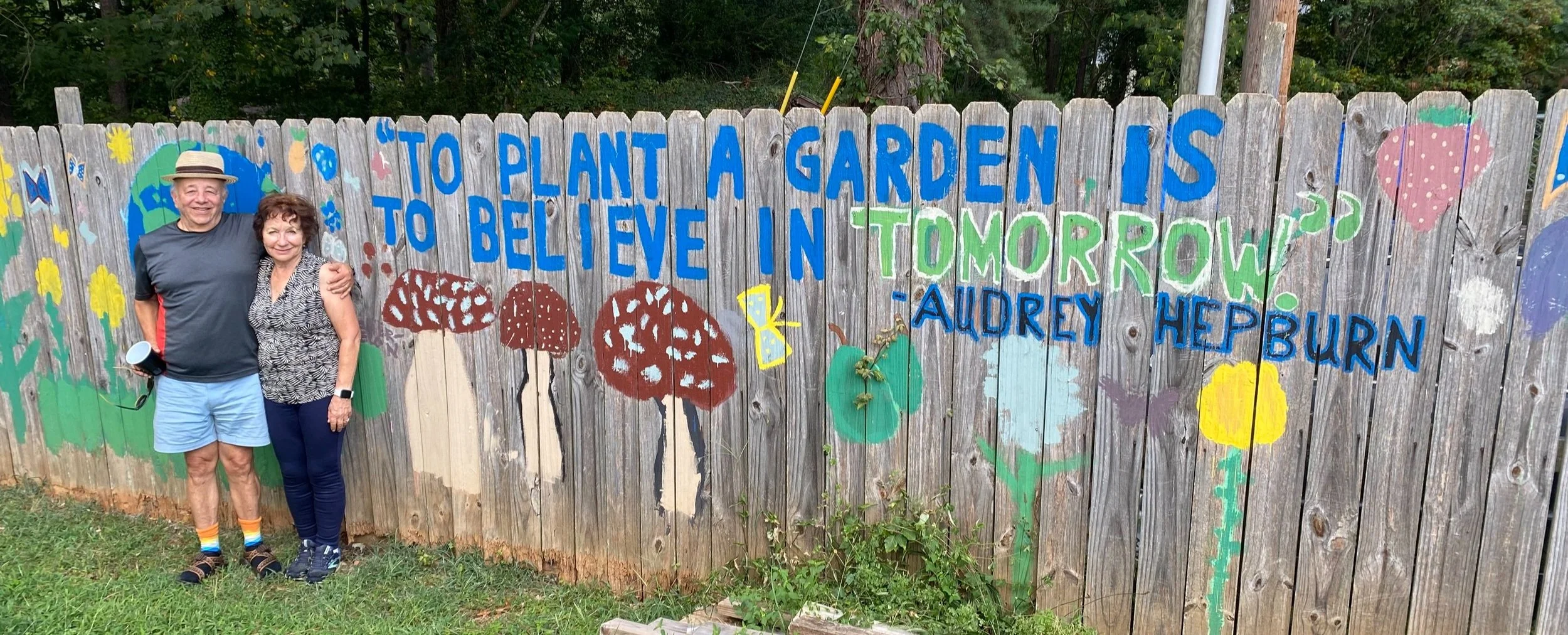Interview with Anya Gordon, Advocate for Urban Agriculture
Anya Gordon, underneath a pomegranate tree at the Well-Fed Garden.
At the Federation, we love to share stories of people in the Greater Raleigh Jewish Community doing amazing things. We talked with Anya Gordon, former co-owner of Irregardless Café with her husband, Arthur. Since selling the restaurant, she has been working to promote urban agriculture and fight against climate change.
Q: Why did you start the Well-Fed Garden? How has it changed?
Arthur ran Irregardless Café for 45 years. We started the garden when we had the restaurant, and the food grown here was sold to the restaurant. The Garden farmers were employees of the restaurant. We bought the land, but developing the property was costly. We became majority part owners with five couples who we are friends with. At the end of 2019, my husband sold the restaurant. At that point, we had to figure out what to do with the garden. Initially, we rented it to an urban farmer, but the pandemic happened shortly after. After that, we advertised and found our current farmer, Lilias Pettit-Scott. We have a different relationship with her. She’s an independent contractor and we subsidize her because growing food is not a cash-positive business. She decides what to grow and sells the produce at the Cary Farmers Markets. In addition, Lilias hosts workshops and offers tours of the Garden.
Q: What programs have you had for the community?
We’ve got students who come here from Athens Drive High School across the street, and Arthur teaches in their culinary program. The garden is still evolving and growing. We’re exploring offering “horticultural therapy,” which uses plants and gardening to promote health and wellness.
Q: You are starting the first North Carolina circle for Dayenu, an organization that fights climate change from a Jewish perspective. How did you hear about them, and why are you starting the Dayenu circle?
We were aware of Adamah, a Jewish organization that promotes connections to nature. They have a retreat center and organic farm called Pearlstone, which is part of the Baltimore Jewish Federation. Adamah is working to get synagogues and Jewish organizations to be totally energy efficient. They want us to walk the talk, and they offer grants. Through them, I became aware of Dayenu.
I am shocked and baffled about climate change, and the people at Dayenu help you act. They show you exactly how to do it. They suggest you form circles of 5-15 people, so we might have several circles locally. Research shows that when 3.5% of the population lobbies for something, change happens on a structural level. By making people who are for the cause more active, we can become that 3.5%. I thought Dayenu was just political advocacy, but they are also into spirituality and ethics. They really want to build community to stop climate change. Dayenu is offering our community a 2 ½ hour workshop where they address that feeling of being overwhelmed. It will be held on Sunday afternoon, October 15.
Arthur and Anya Gordon next to a mural painted by student interns.
Q: Why should the Jewish community care about protecting the environment?
They’ve got a great expression, “We can’t sit by indifferently.” My parents were Holocaust survivors and I take inspiration from a quote by Elie Wiesel, “Neutrality helps the oppressor, never the victim.” We are having a crisis, and we need to act. The home of our children and grandchildren is being altered. Dayenu’s approach is to talk about why we are motivated and care about the climate. They ground their work in Jewish values, like dor l’dor (generation to generation), shomrei adamah (protecting the earth), and shomer ger yatom v’almanah (protecting the vulnerable). They want it to be a spiritual experience. I don’t quite understand that yet, but I am excited to explore a Jewish path through Dayenu.
Q: What are your goals for the future of Dayenu?
They have a different campaign every year at Dayenu, and this year’s campaign is to ensure that the money from the Inflation Reduction Act goes to helpful projects. Last year, it was about getting banks to divest from fossil fuels. They also have recommendations for what Dayenu Circles can do. Ultimately, I want to help make it happen and foster leaders in the next generation.
Q: What do you want people to understand?
Part of the climate crisis is that the way food is grown destroys the environment. There needs to be a shift. Nitrogen fertilizers pollute groundwater and disrupt the living organisms in the soil that keep disease at bay. Returning to organic local food is one way to address the climate crisis. It has to be worked out because it is not cost-efficient, but this is how people lived for centuries, eating local food that’s fertilized with manure.
The first meeting of the Raleigh Dayenu Circle will be September 6th. Click here to register.
For more information on Well-Fed Garden’s events, click here.
For questions, contact Anya Gordon at anya@wellfedgarden.org.


